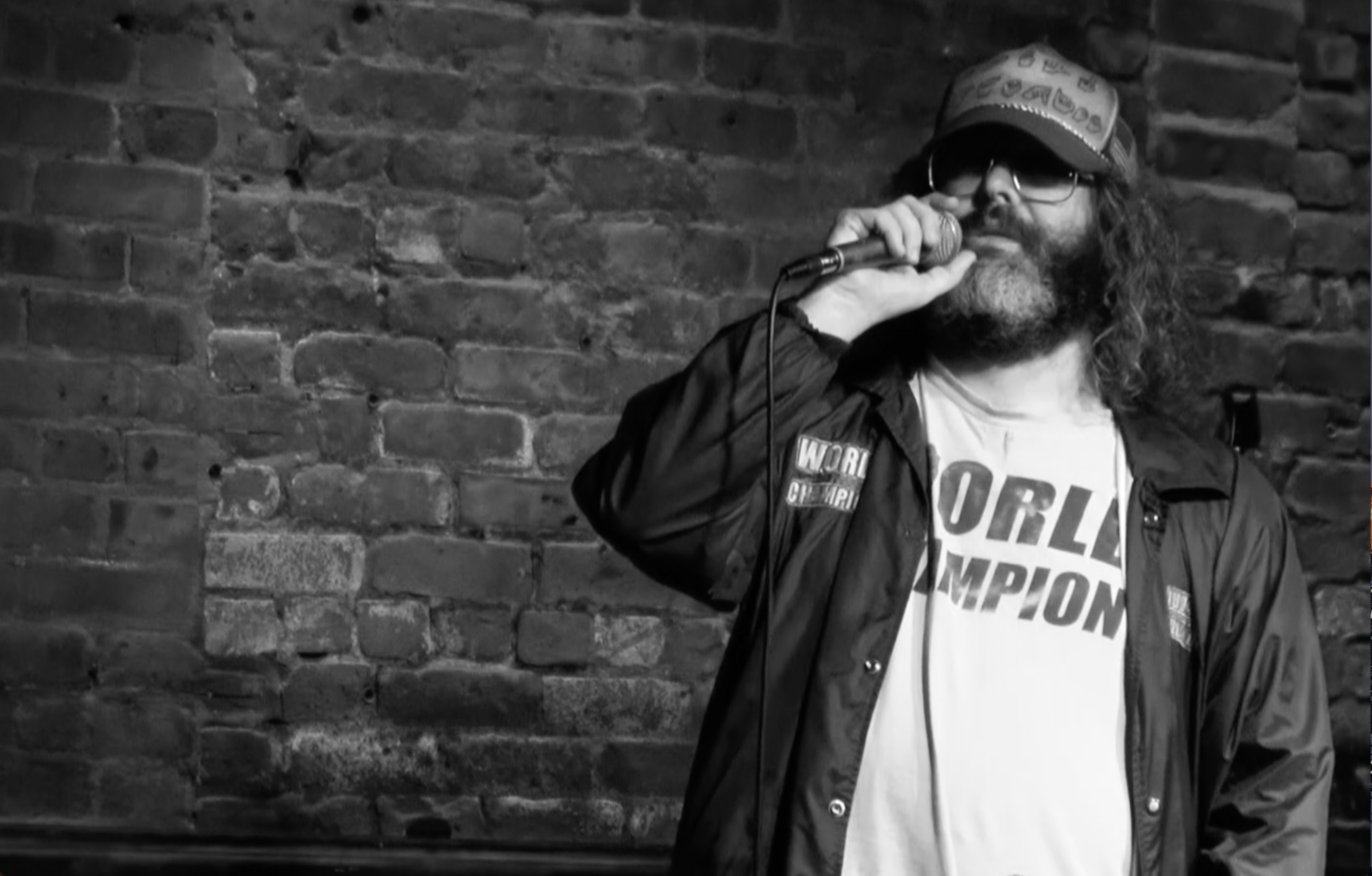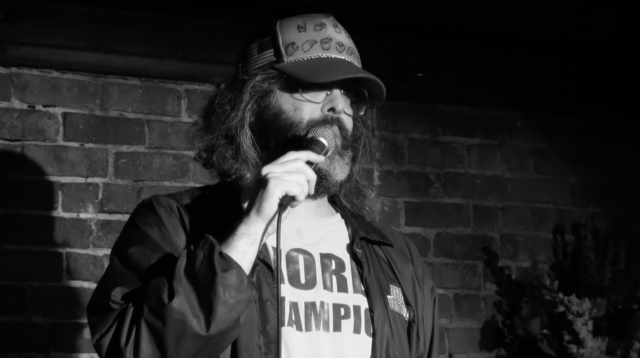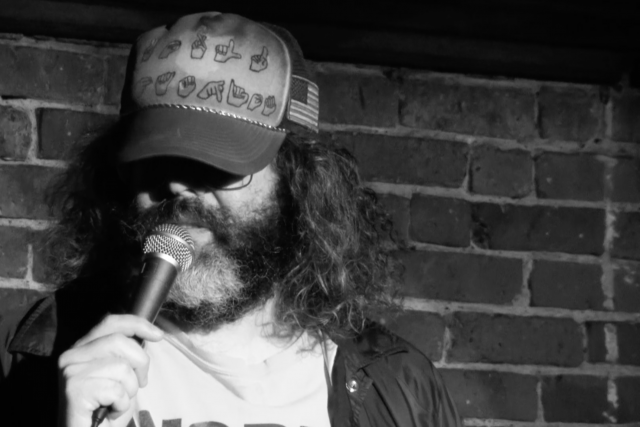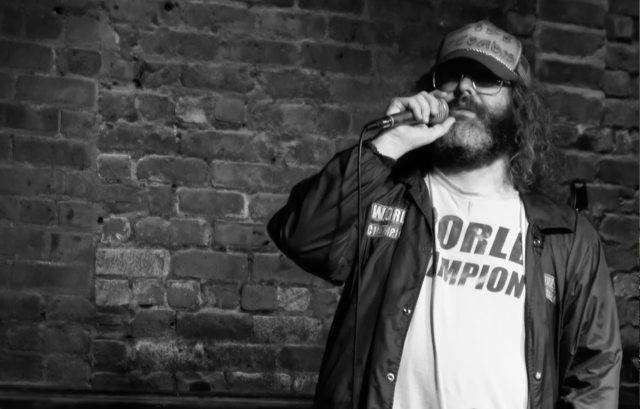World Champion Judah Friedlander Made an 84 Minute Comedy Special in 15 Minute Increments, and It’s Outstanding; Here’s How He Did It


Watch Judah Friedlander: America is the Greatest Country in the United States on Netflix Now.
Despite being considered one of the best in the game, Judah Friedlander has never released an hour. There’s a World Champ book, a second book containing a collection of illustrations, but no album, and no hour special… until now. And it is worth the wait.
Today, Netflix released Judah’s first hour, and it’s one of the best of the year in a year where there have been more specials released than at any time in the history of comedy. Titled “America is the Greatest Country in the United States,” the special breaks all the rules of making an hour special- in fact, Friedlander doesn’t really even call it a special. In conversation, he’s more likely to refer to it as a documentary or a movie. Judah gets rid of any of the conventions that aren’t directly related to the performance of comedy- there are no swooping crane shots, there are no cuts to the audience, no elaborate introduction vignettes, no fancy credits, and there isn’t even any color- the entire 84 minute special- which could not be contained by the standard convention of an hour- is in Black and White. And Friedlander shot it all on small prosumer cameras.
In someone else’s hands, the rulebreaking might come across as gimmicky, but under Judah’s direction, once you remove all of the bells and whistles, what’s left is pure comedy. And that comedy is quite brilliant, and perfectly timed to talk about what’s happening in the United States (and around the world) right now. The 84-minute docu-special weaves in and out of crowd work, but is by no means unstructured. Roughly divided into sections, Judah embarks on the journey first using crowd work with audience members from other countries to illustrate thoughts about American exceptionalism, before moving on to an announcement that Friedlander is running for President and a Q&A session about his candidacy and plans once elected.
What’s really incredible is that Judah filmed the entire 84-minute set in roughly 15-minute spots during regular showcase shows predominantly at The Cellar, the Village Underground and The Fat Black Pussycat in New York City, but somehow is able to create the flow of a complete whole with an arc, and a beginning, middle, end. Anyone who performs stand up will instantly know what an achievement it is to be able to do that. If you don’t perform, I’ll just say it’s nearly impossible to put together a cohesive long-form comedy special using short sets where a part of the time needs to be spent warming up the audience- who just heard short sets from other comedians- to your style. It’s quite extraordinary, and I was very excited to be able to speak with Judah about creating the new special, working with Netflix, why he made the choices he made, and how he made it work.
The special satirizes America’s cultural narcissism and the concept of exceptionalism, but it’s no joke to call Judah’s debut Netflix special exceptional.
Anyone who hasn’t had the chance to see Judah perform stand up, and perhaps only knows him from his World Champion persona, or from his character Frank on 30 Rock or from films like American Splendor, is about to enter a whole new realm. Enjoy it. America is the Greatest Country in the United States is available now on Netflix. Don’t miss it, and make sure to share it with your friends. There’s nothing else like it out there.
The Interrobang: How long of a process was this, from when you said, “Let’s do a special,” to when it was done?
Judah Friedlander: I’m gonna give you the long version. The more ridiculous answer … You know I never even put out an album, and so initially, I remember buying a DAT recorder, an audio DAT recorder, which they don’t even make anymore, it’s an old system. I must have bought that over 15 years ago, and I was like, “Okay, I got this, now I can just make an album, no problem.” Never really made one.
Then that might have been 15 or 20 years ago. So, I always used to wanna make projects, but for whatever reasons, there’s been blocks to me getting them done. So for this particular project, I think I first started filming sets, gosh, it was somewhere in 2016. I probably filmed for about a year before I was able to kind of figure out what was the best way to actually film it. So it’s just learning trial and error, you know? I’d either set up a little camera somewhere, or I would hire someone to do the camera work. I bought my own cameras, and they’re not the most high-end cameras, by any means, but they are cameras that I thought was the best compromise for working for what I wanted to do.
I wanted them small and discreet, I also wanted them to be able to, with just one person operating the camera, keep things in focus. Because there’s definitely much better visual quality cameras out there than what I was using. The camera I was using was, I think it’s what they call a prosumer, it’s between a consumer and a professional camera. It’s probably more suited towards documentary or news footage than actually making movies. But for what I was doing, I thought, “Okay, this is gonna help me the most.”
That was probably a couple years ago, I bought that and then when I decided to make this, I bought a couple more of them, and then I started hiring some people. I would just tell them, “All right, stand here and hold the camera here, get this angle.” I’d line up the angle and tell them what to get, and then they would do that. I don’t know, so that’s probably a year and a half ago. So after about a year of filming, I kind of figured out, “Okay these are the best angles to be doing it.” So some of them were little cameras that I just set up somewhere in the room, and then sometimes I’d have one person, maybe two people filming. So sometimes it was just one or two of my own cameras set up, and then sometimes it was just one person filming.
The Interrobang: Early on, did you know that it was gonna be a documentary, was it gonna be a standup hour special?
Judah Friedlander: I knew it would be at least an hour. I made a decision early on, I think, that this was mostly gonna not be like where I do a 60 or 90 minute set, and just film that.
Depending on my schedule, if I’m in New York, where I live, most of my sets are not 60 or 90-minute sets. When I tour, I usually do between 70 and 90-minute sets on the road. But when I’m in New York City, I usually do anywhere from two to five 15-minute sets a night. And so I decided, “You know what? I wanna film this in the most honest and sort of natural way of circumstances where I normally do things.” I wanted to just get regular nights, and just film regular sets on regular nights, and just keep it as natural as possible. So looking back, it certainly made the editing a hell of a lot more long and difficult, you know. It would have been better to just film a couple of long sets. My next one, I might do that, I don’t know. But this one I decided, “Look, I want this as natural as possible. I’m just gonna film mostly just regular sets.” I did film a couple of long sets, too, but most of the stuff is from just regular nights at the Cellar.

The Interrobang: There are so many things that are mind-blowing about that. Most people might not think about that, but when comedians put together an hour, there are things you can’t get into until you’ve warmed people up to you.
Judah Friedlander: Yeah, that was part of the … that was an issue. I started just working on that exact same thing, because sometimes the heavier stuff, like when I’m talking about, you know, some long bits about racism, you know? That’s hard to get into right up front. You have to sort of build to it, like if I’m headlining and doing that material, I might have that come in 30 or 40 minutes into my set. So I’m like, all right, I’m gonna work and try to figure out how I can start this two minutes into my set. It was challenging, but ultimately good. There are ways to do it, you know. It wasn’t the easiest way to do it, but that’s the way I did it.
The Interrobang: I hadn’t thought about that aspect of it until I think this morning, when I was thinking about what we were gonna talk about.
Judah Friedlander: That’s a great question. I’d forgotten that, but that was definitely an issue, and some of that material I had … some of the racism material I initially had stuff from another night in there. Same material, basically, but from another night. And then I realized I didn’t really like the camera work on it. So I’m like, “Alright, I need to redo this and get the camera work a little better on this.” And then I actually had to do some of that stuff on short sets, you know, I’d just get into that right away, so it was not the easiest thing, but that’s the way I had to do it.
The Interrobang: Did you map out the 80 or 90 minutes before, or did you figure out the structure and the order after, through editing?
Judah Friedlander: It was a mix. I’m someone who’s not an organized guy. Even when I’m headlining and I’m doing a 70 or 80-minute show, I usually don’t have a great idea of what order I’m gonna be doing things in, or maybe even what material I’m going to be doing. I kind of just figure it out as I go. And then, I also do a lot of audience interaction, crowd work, so sometimes I don’t know … sometimes there’s many things I don’t even get to, because I’m dealing with the audience, and sometimes it takes me in directions that are completely unexpected and new, and then sometimes it takes me in directions of material I’ve done before, but then there’s other stuff I never get to. So yeah, it was a mix of knowing what I wanted, and then also in the editing figuring out how I wanted things to go, and then putting things together in a way where there might be a little more structure to it. Maybe not even structure, but just so that things kind of flow on a subject-wise and also on an emotional level, how things flow.
So it was a mix. And that’s the other thing, it would’ve been easier to do it like I said, just filming a few longer sets, because then all the flow, even if it’s all over the place, it’s natural, and it’s real. So, I’m trying to create that, but it’s with a bunch of short sets. It really would have been better to do some longer sets. Initially, there was more crowd work up front. In one of my initial cuts, I might’ve had 20 minutes of crowd work and dealing with people from other countries, and some of that would flow into bits on certain things, also.
And then I decided … I showed it to a couple friends. One guy would say, “Do you think…you need to get to some of the more heavy meat of the material earlier?” and I was looking at it, and I’m like, “You know, I think he’s right.” Because even when I headlined, and let’s say I’m doing some crowd work up front, it’s usually not 20 minutes straight of crowd work. I usually weave in, you know, prepared bits in it, so that it’s not just, you know … So that’s what I did. Some of the heavy satire of America being number one stuff, I moved that up a little earlier.
The Interrobang: Your crowd work does blend with the material…
Judah Friedlander: Yes, it does. Yes. So it can be tricky to figure out. The editing process can be– you’ll have a lot of anxiety because you’re just kind of sitting there all alone, or even though I worked with editors who were manning the computer and making the cuts, I would tell them where to make all the cuts. So even though I’m working with an editor, I’m the one who’s actually deciding where all the cuts go.
The Interrobang: How long did that editing take?
Judah Friedlander: It’s hard to say, because it’s been months, but it wasn’t months where it’s just working every day non-stop. I worked with freelance editors, so I think in the credits, I think I have four different people credited in the editing. I wasn’t always available, and they weren’t always available. I had to do it with different people, too. It was a long process, and frustrating, because it wasn’t very organized, just like I’m not very organized. Usually when you make a movie, you have your crew set, and then you just fucking start on day one and you finish it on day whatever. This is just, this is really made like a low-budget indie movie, where everyone’s got other jobs and you’re just, on every bit of off-hours you’re working on this.
I remember a year ago, I filmed a bunch of sets and I cut it together, and I think it was an hour or something like that. And then I realized, “I don’t want to put this material in there. I don’t like the way I filmed this.” I did about a year of trial and error with filming and editing before I really kind of figured out how I wanted to do it. And then, so most of it was filmed this spring. But I filmed so many sets and did editing off and on for over a year before; you know, just a learn by doing. Somewhere earlier this year, I kind of figured out, “Okay, I think this is how I wanna edit it, this is how I wanna film it.” Then I started putting it together, a whole new version of what I had from like a year before.

The Interrobang: Did you ever sit down and figure out how many minutes you had all together to choose from for it?
Judah Friedlander: No. No, I never did that, because I wanted this to be thematic, so I could do a whole other special of World Champion, and athletic, and achievements, and stuff like that. None of that’s in this one, so this one, I wanted to all be thematic about American exceptionalism and the whole idea of, “We’re number one,” because that being the main theme. And the World Champion persona, that blends into that too, you know. Part of the world champion persona is satirizing self-promotion and narcissism.
The Interrobang: You must have had no idea when you started going down that World Champion path, how much it would come to the center of our culture. It’s unreal.
Judah Friedlander: Yeah, and I still don’t know where things are going. That’s a great point you bring up, because to me, stand up, you can only plan it so much, you know. The way I work, I do a lot of writing offstage, but I might do more writing onstage. There’s no stand up without the audience. People often ask me, “Stand up must be so hard, all those, you know, audiences.” I’m like, “Audiences are the easiest and best part of stand up. The business side is what can drive you fucking crazy. But audiences are great.”
Watch Judah Friedlander’s debut hour special, America is the Best Country in the United States streaming on Netflix now. Get there directly by clicking this link.
